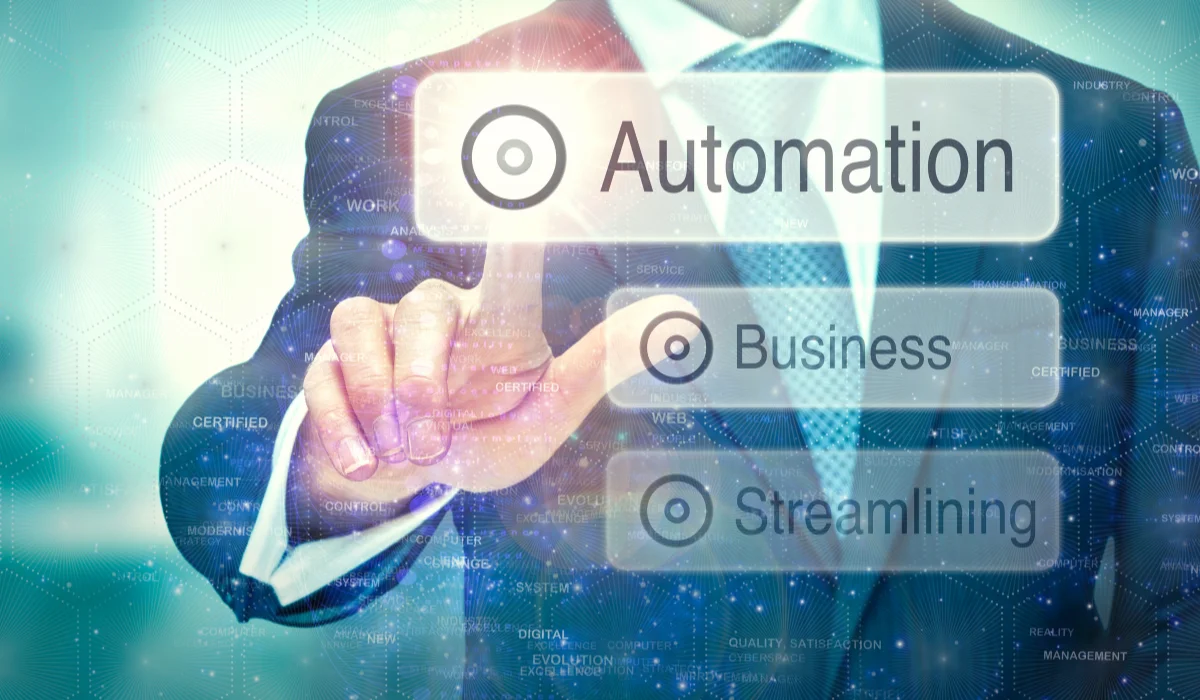While industries worldwide strive to improve efficiency and create new ideas, enterprise AI development is emerging as a transformative solution. Gone are the days when AI was merely a tool for automating routine tasks; today, it is at the core of driving data-driven business strategies. The strength of enterprise AI is its capacity to process huge amounts of data in real-time, revealing hidden patterns and insights that were previously out of reach.
This ability improves operations efficiency but also allows companies to anticipate market trends and react proactively. Whether it’s improving logistics or transforming customer service, AI development has many advantages. It allows companies to make better-informed choices, design personalized user experiences, and keep the edge in a constantly evolving market.
It is crucial to embrace this technology for companies that want to be innovative at a timely and cost-effective pace and remain current in an ever-changing business environment.
What is Enterprise AI Development?
Artificial Intelligence has received considerable attention lately, primarily due to the work of OpenAI and its excellent Natural Language Processing model, ChatGPT. Although these AI technologies garner the most attention from the media, their applications in enterprise differ somewhat.
Enterprise AI refers to the use of Artificial Intelligence technologies within organizations. Its purpose is to improve processes, enhance the quality of decisions, and elevate customer experience. Additionally, it plays a crucial role in boosting business growth.
In contrast to developing consumer-focused AI applications, enterprise AI development is focused specifically on solving business issues and specific industry challenges.
How Does Enterprise AI Work?
Technically, it combines technology and processes to provide the ideal intelligent solution. This integration is built on essential elements given below that define the process for an organization’s AI software system.
1. Data Collection and Integration
It begins with the learning stage, in which the system gathers unstructured and structured data from various sources.
2. Data Preprocessing
This component, also known as reasoning, is the process of cleaning and altering the data. Enterprise AI platforms choose the best algorithm for each data set.
3. Data Collection and Integration
Effective AI solutions begin with solid analysis and data integration. This ensures that data from all sources of interest are integrated and accessible, providing an extensive foundation for building AI applications.
4. Data Preparation and Cleaning
Before data is fed into an AI model, it has to be cleaned and prepared. This eliminates errors and fills in gaps. It also ensures that the data is in an acceptable format, leading to more accurate and reliable AI results.
5. Model Training and Development
Model training is when the AI solution is taught from the information. In this phase, algorithmic refinements are made, and models are designed to ensure optimal performance on real-world tasks.
6. Deployment
Once they have been trained, AI models are deployed in the company’s systems. The deployment process involves integrating AI into workflows already in place and ensuring that it is seamlessly integrated into operations.
7. Monitoring and Maintenance
Following deployment, continual monitoring and regular maintenance are vital. This will ensure that the AI system remains efficient, can adapt to changes, and provides consistent results.
8. Feedback and Optimization
AI systems thrive by receiving feedback. Regular feedback loops and optimization efforts can help improve the algorithms to make them more effective and aligned with business goals over time.
9. Integration into Business Processes
For AI to be efficient, it must be incorporated into essential business processes. This ensures that AI solutions are not only technically sound but are also strategically appropriate.
10. Security and Compliance
Compliance and security are essential for the process of AI deployment. Security of sensitive data and the assurance that AI systems conform to rules and regulations are essential for keeping confidence and avoiding legal traps.
Benefits of Developing Enterprise AI Solutions

Enterprise AI solutions bring many advantages, such as more efficient processes and workflows, higher efficiency, better customer experience, and faster sales time frames. You can achieve a complete corporate transformation if you select the best enterprise AI development company.
1. More Streamlined Processes and Workflows
Enterprise AI applications can help companies improve their workflows and processes. AI-based enterprise applications can automate processes such as meeting and call transcription and data entry, as well as other tasks that require labor. Artificial intelligence may even be able to identify which tasks can be automated to improve workflow efficiency.
2. Greater Productivity
One way businesses can increase their productivity is to choose a reliable enterprise-wide communication system. AI allows for better communications across the entire enterprise, making each team more efficient.
The real-time transcription and call recording capabilities, integration with numerous applications, and tools, allow efficient communication across teams.
3. Improved Customer Experience
AI-powered enterprise AI can also improve customer satisfaction. For example, a company chatbot. If customers have questions, these bots can look up information in a company’s knowledge bases and connect a customer with the right human agent to reduce customer dissatisfaction. This improves the overall experience for customers and improves satisfaction with your company.
4. Shorter Sales Cycles
AI can shorten sales cycles by using enterprise chatbots to automate and streamline the selling process. AI can increase the efficiency of your sales team by helping nurture leads and offering customers a personalized, conversation-driven experience while also reducing the sales cycle through the automation of follow-ups.
Most On-Demand Enterprise AI Skills

With AI technologies expected to continue increasing in the global business environment, businesses are looking for employees with the highest level of expertise in AI. Some of those skills include:
1. Model Tuning
Model tuning is an essential ability in machine learning and artificial intelligence. Expertise in this field is vital for those who work with AI techniques since it requires tweaking parameters to improve the effectiveness of AI models. This assures that models are tuned to achieve specific goals and provide precise, reliable results.
Knowing how to adjust models allows teams to improve the efficiency and performance of AI systems. This is especially relevant when it comes to the field of generative AI (Gen AI) applications, which require high-quality outputs and precise behavior are essential. The ability to tune models effectively helps to ensure AI solutions can meet the specific demands of both businesses and clients, resulting in improved products and services.
2. Ethical Considerations
Knowing the ethical implications of AI development is vital for all employees. As AI and technology continue to advance and develop, understanding their social and ethical implications can ensure fair and responsible usage. Employees should be aware of addressing bias in algorithms and cybersecurity issues to avoid negative outcomes and maintain the public’s trust.
The knowledge of ethical behavior also assists employees in complying with rules and guidelines, including those in the EU AI Act and other international standards. Companies that value ethical considerations highly create stronger internal policies and more trust with customers and other stakeholders.
Additionally, understanding these issues is vital to creating AI systems that align with social values and contribute to advancing technology worldwide. The British Standards Institution (BSI) emphasizes that bridging trust gaps between AI and humans AI distrust gap as well as building confidence in AI technology are essential in unlocking its full potential and ensuring that it serves the entire human race.
3. Gen AI Modeling
Gen AI models are crucial for companies that use AI for their customers since they can recall previous interactions. This makes the outcomes more consistent and meaningful for the end user.
The skill also requires programming, which simplifies the creation and implementation of various generative models for AI developers. Many programming languages could be employed in a commercial setting, with Python being the most used.
4. Machine Learning
The ability to master machine learning algorithms is essential. This means understanding different types of learning, like unsupervised, supervised, and reinforcement learning. These are essential to developing algorithms for predictive modeling and systems to make decisions.
5. Deep Learning
The ability to master methods of deep learning is vital. Experience in deep neural networks, convolutional neural networks (CNNs), and recurrent neural networks (RNNs) can facilitate the development of advanced models that can handle tasks such as image recognition or the natural processing of language.
6. Data Engineering
Competency in data engineering is essential for the preparation and management of data. This involves data cleansing, preprocessing, and technology engineering that ensures the information fed to AI models is correct and valuable.
7. Cloud Computing
Understanding cloud platforms like AWS, Azure, or Google Cloud Platform (GCP) is essential for deploying and growing AI applications. Cloud computing offers the infrastructure required to manage massive-scale AI tasks efficiently.
8. Big Data Technologies
Experience with big data technologies such as Hadoop, Spark, and NoSQL databases is essential for processing and managing huge quantities of data. These tools aid in managing massive datasets and allow instantaneous data analytics.
Enterprise AI Architecture: The Five-Layer Model
The enterprise AI architecture usually consists of many layers to build a seamless AI system. The five-layer model is a common strategy to divide the different parts of an AI platform into different levels, each with a purpose. A five-layer business AI architecture paradigm can be described in the following manner:
Infrastructure Layer
The infrastructure layer provides the computing power required to process data and analyze it. It is made up of hardware that accelerates AI computations, such as servers, GPUs (Graphics Processing Units), and other tools designed for specific purposes. Enterprises can have an adaptable and scalable infrastructure using cloud-based platforms such as AWS, Azure, and Google Cloud.
Data Layer
Data is the core of the entire AI system. It is gathered and stored within layers of data. Data cleansing, such as transformation, standardization, and enhancement, falls under this layer. Quality, well-organized data is required to build precise and effective AI models. Companies often use warehouses or data lakes to manage and store huge amounts of data.
Service Layer
The service layer provides services and deploys AI models to services, applications, or end users. This layer creates APIs (Application Programming Interfaces), allowing communication between systems and AI models. It includes activities like monitoring, scaling models’ deployment, and monitoring. Microservices and containers are commonly used to facilitate and manage the deployment process.
Model Layer
In the end, AI models are developed and honed at this level. At this level, the most appropriate algorithms are selected, the neural network design is developed, the hyperparameters are adjusted, and models are then trained with labeled data. Building and training AI models at this level is an everyday practice with machine learning frameworks like TensorFlow or PyTorch.
Application Layer
AI capabilities are linked to business processes. AI capabilities are connected to business applications and processes at the application layer. This layer includes creating apps that utilize the recommendations and predictions generated by AI models and include AI insights into decision-making processes. These applications can be utilized in various areas, such as fraud prevention, supply chain optimization, and customer service.
Practices for Implementing Enterprise AI
Enterprise AI has several important applications that can be used to run a myriad of business activities and processes. Before you begin implementation, it is important to comprehend the best applications for this incredibly powerful technology.
1. Assess Data Preparedness and Develop a Data Strategy
Before beginning any corporate AI project or hiring enterprise AI development services, it’s essential to evaluate your company’s readiness. This means assessing the current status of your data in terms of quantity, variety, and quality. Find gaps and inconsistencies and evaluate whether your data is tidy, well-organized, and appropriate as a basis for AI applications.
The next stage is developing a complete data strategy. The strategy must define how data will be collected, stored, processed, and analyzed. It should also include the data governance issue, including ensuring compliance with applicable regulations and data security and privacy.
Create clear protocols for integrating data from different sources to create a single, accessible data repository that can serve as the basis of any AI initiatives.
2. Build a Cross-Functional Team
The successful deployment of corporate AI requires an interdisciplinary team with a range of capabilities and perspectives. The team should comprise software data scientists and engineers, IT professionals, business analysts, and domain experts. Each team member plays a vital part in various stages of the AI project, from data preparation and modeling development to maintenance and deployment.
Collaboration among experts is vital for developing AI enterprise solutions. Regular communication and a mutual understanding of the project’s objectives ensure that the solutions are technically sound and aligned with the company’s goals. Instilling a constant learning and flexibility culture can help keep the team current with the most recent AI developments and the best methods.
3. Launch a Pilot Program
A pilot program is an ideal way to evaluate an AI project’s efficacy and potential impact at a lower scale before the full-scale deployment. Begin by choosing a specific application that can be managed and has clearly defined goals. This could be a procedure improvement within a particular department or a specific customer service enhancement.
The pilot program lets you detect potential problems and fix them early, thus reducing risks. It also gives you the chance to collect users’ opinions to improve models and further integrate your system.
Use the lessons learned during the test phase to make informed changes to your method, ensuring an easier transition to deployment. Recording the lessons learned and best practices in this phase can help expand this AI solution across your organization.
4. Implement Ethical AI Practices
Ethics are a significant consideration when designing and applying AI systems. Setting guidelines for the use of AI is crucial for ensuring ethical practices, focusing on accountability, fairness, and transparency. Establish mechanisms to recognize and reduce the effects of biases in models and data.
Develop a governance system with ethical review panels or committees to supervise AI projects. Regularly audit AI systems to ensure they adhere to ethical guidelines and don’t allow harmful biases or practices to persist.
Increase transparency by logging AI decision-making procedures and providing stakeholders with detailed descriptions of how those decisions are made.
5. Monitor and Maintain AI Systems
After the AI system is in place, it is imperative to consistently monitor to make sure it operates as intended and produces the expected results. Set up benchmarks and performance indicators to measure the system’s effectiveness. Check these regularly to find any performance issues or deviations.
Maintenance should involve changing models to reflect new information to increase accuracy and relevancy. Automated monitoring tools can detect unusual behavior or anomalies in real-time. Ensure there is a procedure of periodic retraining models to adjust to changes in data patterns and business demands.
Enterprise AI Applications in Real-World
Enterprise AI applications are used in various industries and companies worldwide. B2B companies such as IBM, Salesforce, SAP, and Oracle. They leverage AI to optimize their business operations, improve customer relationships, and drive innovation.
1. Customer Service
We have already mentioned that chatbots can assist businesses in improving the quality of their customer service.
Conversational AI bot for enterprises can assist you in quickly resolving issues with customers and personalizing your customers’ experience on your website with suggestions and chat capabilities. As a result, you’ll get more satisfied customers who are more likely to buy something from you and will recommend your business to friends and colleagues.
An excellent example of a business leveraging AI is Lufthansa, which aims to improve its customers’ traveling experience through its AI initiatives.
2. Sales
There are many use scenarios for artificial intelligence within sales. Research conducted by Salesforce found that teams with the highest performance are 4.9% more likely to use artificial intelligence in sales than those that perform poorly, and this doesn’t surprise me.
AI employed in the workplace can predict the most likely prospects to be closed, forecast sales, and recommend the most effective action—eliminating much of the uncertainty. It can also assist you in guiding reps on a large scale (I’ll discuss the specifics of this in a moment), optimizing pricing, and much more.
For instance, you could utilize sales AI software that will let you know how often your competition appears in sales calls.
According to McKinsey, sales professionals who adopt AI have increased appointments and leads by 50%. But you need to be aware of how to use AI to your advantage. It’s currently not feasible to automate every aspect of the selling process. AI can’t handle complicated problems and human interactions, so it needs to be coupled with human interaction.
3. Recruitment and Talent Management
AI enterprise software can be employed to manage talent and recruitment. From resume screening during the initial phase of hiring to body language screening in the interview process, AI is utilized by various household names to match new hires to jobs as per the requirement of your projects.
Amazon utilizes AI to review resumes, identify candidates for the roles they are applying for, and conduct initial assessments. Unilever collaborated with Pymetrics to enhance their hiring process by utilizing Pymetrics’ cognitive and emotional assessment tools.
These tools leverage neuroscience-based games to assess candidates’ soft skills and cognitive abilities, rather than analyzing video footage of facial expressions and body language. The collaboration aimed to improve the hiring process through more objective and data-driven assessments, helping Unilever make more informed and unbiased hiring decisions.
4. Financial Reporting and Accounting
When integrated into applications for enterprise use, AI can provide substantial advantages in financial and accounting reporting. AI can help automate mundane tasks like reconciliation and data entry, reducing human error while reducing time. AI also increases your financial forecasting accuracy by analyzing huge amounts of data and finding patterns that might not be obvious to human experts.
Furthermore, AI can detect fraud by monitoring real-time transactions and identifying suspicious activity. These capabilities enable financial professionals to concentrate on more strategic work, which improves efficiency and the ability to make decisions.
5. Process Automation
Enterprise chatbots can help in internal process automation. They can manage inventory, complete data entry, and onboard employees. They can also automate customer service processes such as updating account information in real-time and save your company time and resources.
Cost of Building an Enterprise AI Application
The cost of developing an organization-wide AI application will vary depending on various factors. The number of employees you have, the expertise of your company, your objective, and so on can affect the overall costs. Here are some of the key factors that contribute to the overall cost, whether you are hiring an Enterprise AI development company or building on your own:
1. Development Costs of Enterprise AI
This covers the costs of designing and building an AI system. The development costs depend on the level of complexity of the AI application, the type of technology used, and the amount of time spent.
2. Data-Related Costs
The amount and quality of data can significantly impact an AI system’s efficiency. Thus, the expense of acquiring, cleaning, and archiving data is massive.
3. Infrastructure Costs
This includes the cost of software and hardware, as well as the cost of establishing and maintaining the AI. The more powerful and larger the AI, the more effort will be required to develop the appropriate infrastructure.
4. Upfront Costs
Before you can use generative AI, you must invest money on API cloud services or local servers that implement open-source LLMs.
5. Ongoing Costs
If you are using an on-site LLM, it is vital to consider regular system maintenance. This is essential to ensure model training and updates depending on the application.
Conclusion
Integrating AI in enterprise applications could be the most technological leap of our time in the direction of technology. The road ahead is paved with crucial choices that will determine the direction of progress. Data privacy is a legal requirement and a key element in establishing trust and security within enterprise AI applications.
The choice of AI models, and especially the decision to use open-source solutions, reflects an investment strategy for your AI initiatives’ viability in terms of innovation, diversity, and sustainability.
As we are on the cusp of AI advancement, it is crucial to ensure that you make educated, rational, ethical, and strategic decisions. AI’s potential is enormous, but its full potential can only be realized if these critical factors are attentively considered today to avoid mistakes and gain real value in the future. Taking enterprise AI development services is the best way to ensure your success.



